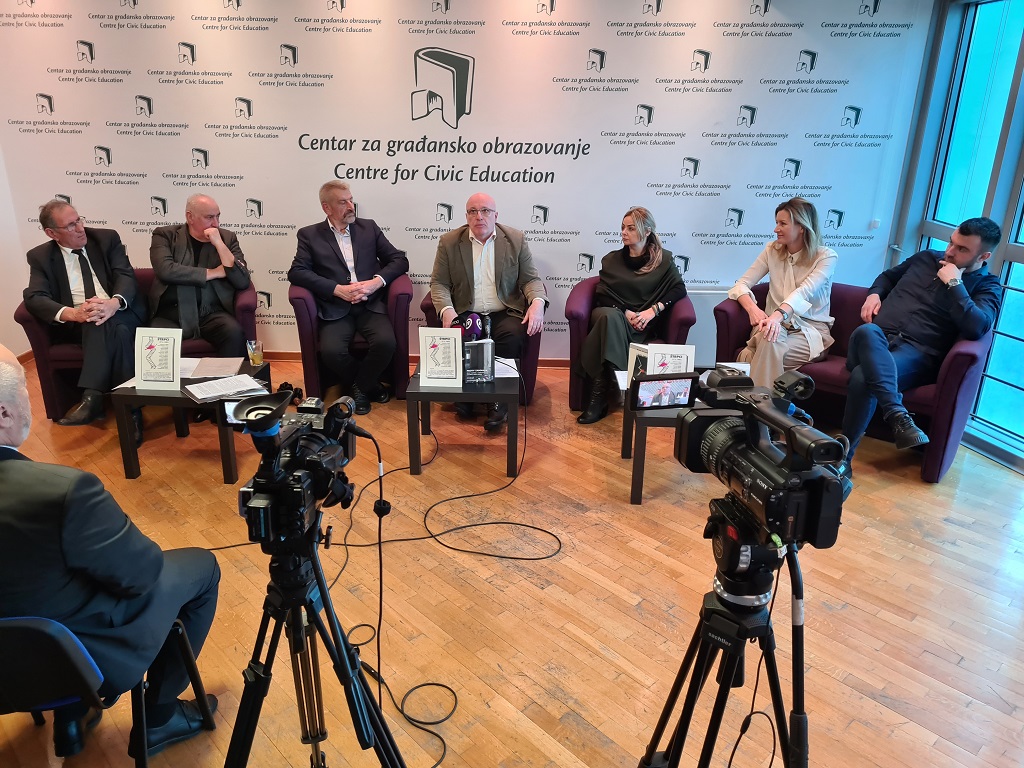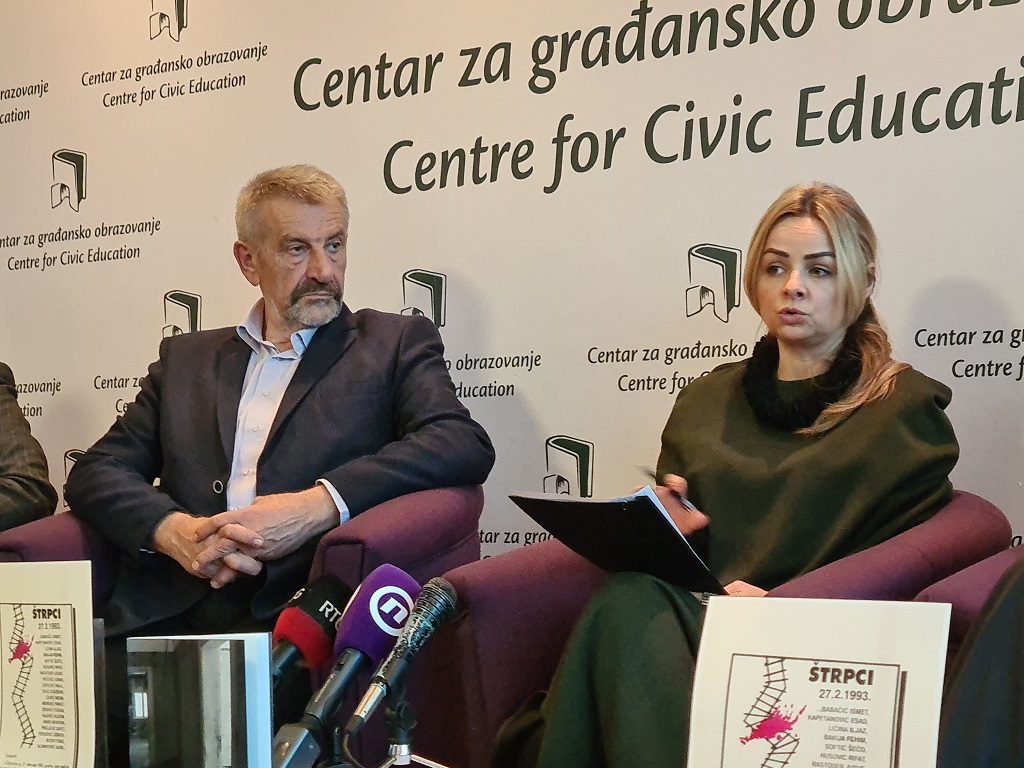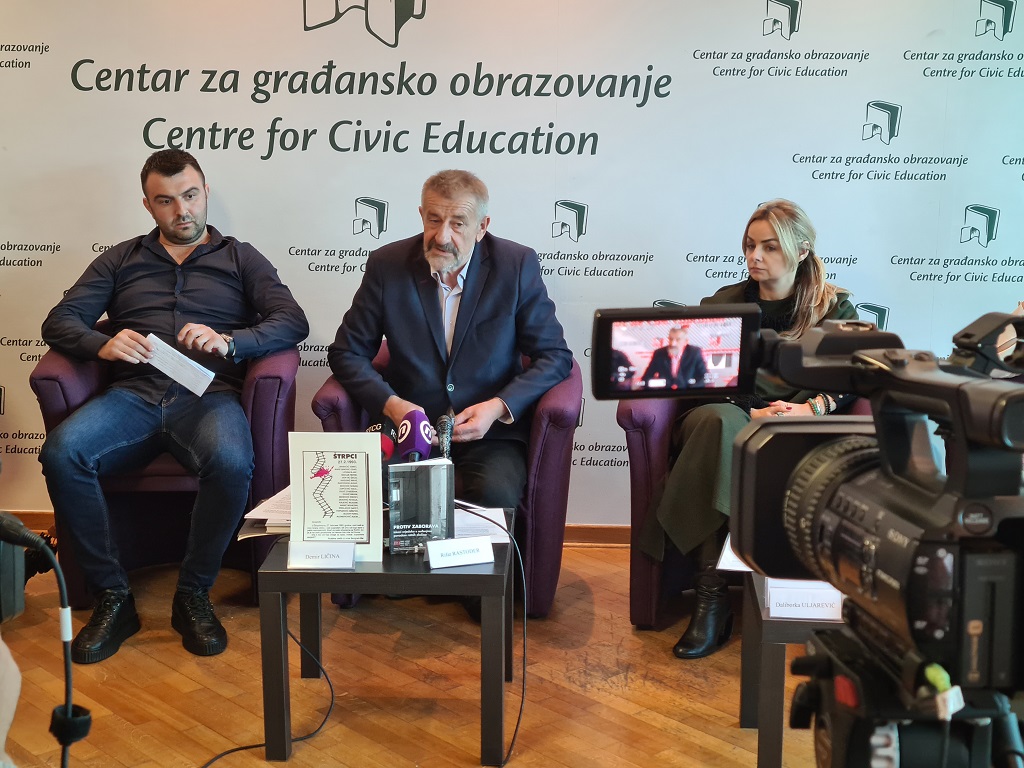“For three decades, the Montenegrin authorities have ignored the crime in Štrpci, and the families of the victims still do not have the status of civilian victims of war. The resolution on the crime in Štrpci, which was initiated by the victims’ families, has been waiting since May in the Parliament of Montenegro for its turn to be debated, and those people who sacrificed themselves to help the victims are also being forgotten,” it was said, among other things, at the conference. “Kidnapping in Štrpci – a continuing crime” organized today by the Bosniak Council in Montenegro and the Centre for Civic Education (CCE).
The conference gathered lawyers, witnesses, civil activists and analysts who spoke from different angles about the circumstances and this crime against civilians, the consequences and possible outcomes of approaching justice, but also the obligations of state institutions and the judiciary in the area of humanitarian and social measures to care for victims and families.
“Bosniaks cannot and will never forget the victims of the kidnapping from the train in Štrpci, as well as other civilians who died in the mindless, genocidal wars of 1991-2021. With memory and remembrance, we must respect both the victims and ourselves, even those neighbours who have yet to understand who committed serious crimes in their name,” said Mirsad Rastoder, representative of the Bosniak Council in Montenegro at the opening of today’s conference. He recalled the chronology of this war crime, stating that it was a planned attack on the state and military centres of the country at that time, for which only two accomplices in the crime – Nebojša Ranisavljević and Mićo Jovičić – have been punished to date, while 12, recently convicted in the first instance in Sarajevo and In Belgrade, is awaiting a final verdict, and the ringleader of the kidnappers, Milan Lukić, was sentenced to life imprisonment in The Hague for other crimes, and he has been charged with Štrpce only since 2015 by the Court of Bosnia and Herzegovina. “The abduction in Štrpci is not a coincidence, but part of a strategy of ethnic cleansing that the Yugoslav people did not recognize in the early 1990s. Then it was too late, so they paid dearly for it and are still paying. This is why we must remind people today and on other occasions about the ethnic cleansing of Bukovica, the deportation of refugees, the Morinj Camp and the liquidation of civilians in Kaluđerski laz so that the younger generations know how to recognize evil in its beginnings and that by defending others they can defend themselves and their long-lasting peace. Evil is a reality, and facing the past is the first step for a society to overcome the evil within itself,” he said. Rastoder also reminded that the families of the abductees are still in the agony of waiting and emotional torture. “By continuing to cover up evidence and witnesses, planners, facilitators and their helpers remained beyond the reach of justice, and Lake Perućac is a mass grave,” he emphasized.
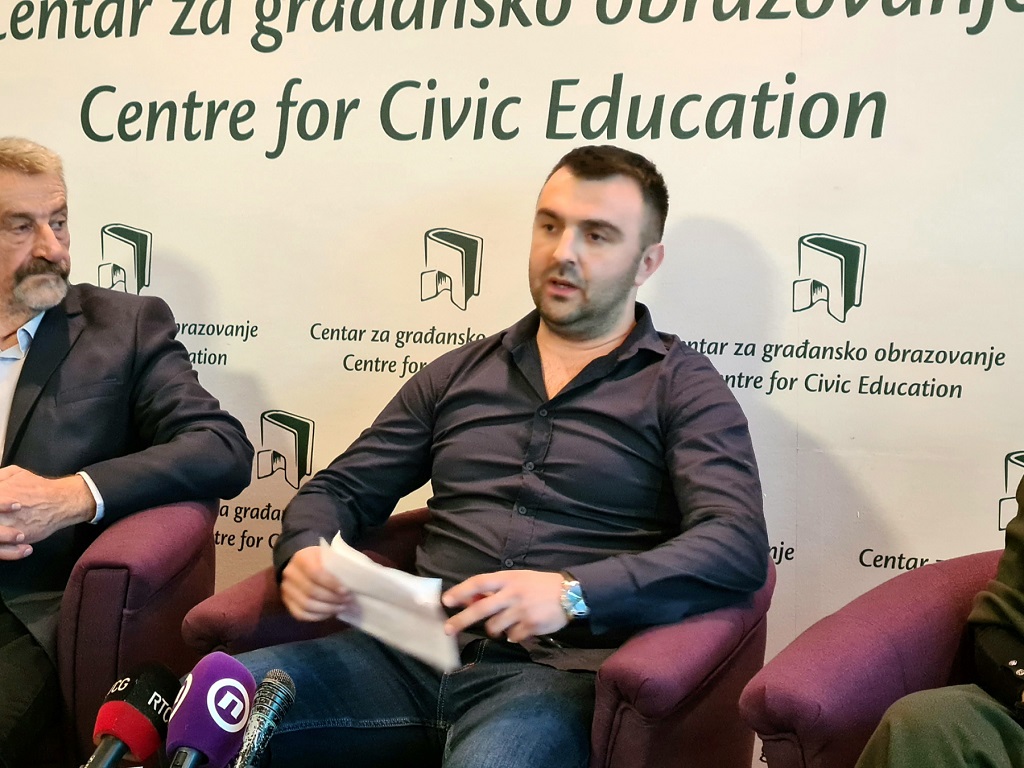
Demir Ličina, the representative of the kidnapped, who lost his father Iljaz in the crime in Štrpci, is firmly resolute in his view, that the kidnapping was a state crime. “All the abductees were carriers of families, people who contributed and supported families, which after the loss of their loved ones were socially marginalized, left without systemic care that would facilitate their status. A large part of them was therefore forced to leave the country. Thirty years is too long a period, so it seems to me that there was no intention to help the victims or families, nor to serve justice,” he said. The continuation of the investigation with an emphasis on the discovery and prosecution of the perpetrators, the continuation of the search for the remains of all victims, social care for families through the recognition of the status of war victims are the demands of the victims’ families that remain unfulfilled even after three decades. “The fight for the memorial lasted seven years, and it was made thanks to exceptional individuals who largely predestined their lives to this event,” he said. Ličina believes that after so much time has passed, it is no longer possible to talk about justice. “Crimes are kept silent, and some have profited from them politically. Since we did not receive an adequate response from the authorities, we translated the demands into the Resolution on the crime in Štrpci, which was proposed to the Parliament of Montenegro, and it contains all our demands. The Assembly has not even put that resolution on the agenda yet, even though it was submitted in May last year. I hope that it will be discussed at some point, because we want to hear the voice of the state regarding this crime. As a society, we should be mature enough to take a clear stance towards this crime to prevent something similar from happening to someone in the future,” said Ličina.
Igor Lakić, a passenger on the train and a witness to the kidnapping, has been carrying the memory of the train he boarded in Užice for decades. “I got on the train to Štrpci because I was going to Sofia for a visa. On the way back, that day, a man who looked like a Chetnik from Partisan films got into my compartment. Everything seemed like I was dreaming. They identified us all and introduced themselves as the Serbian Chetnik army. Then they took some people out, and from the compartment I only heard the question “What are you going to do with us now”, to which the answer was that they will just be counted and put on another train. Their address was not harsh, and it was their way of carrying out the action without resistance. All the passengers of the train were standing, some were even in the corridor of the train, so we heard what was happening, and that they were loaded into the truck,” recalls Lakić. He gave a statement about this crime to the inspectors sent by the Serbian Prosecutor’s Office before the competent Montenegrin authorities, and later he also testified before the court in Sarajevo in the process that was conducted there. “I was brought into the court in Sarajevo through a special door, informed about the rights and possibilities in case of discomfort due to the presence of suspects in the proceedings. After a short conversation with the judge, I had questions from the prosecutor, and then the lawyers of the suspects and the suspects themselves. That confrontation was very difficult, but I think it is important to talk about what we saw and experienced. I am glad that the first-instance verdict was handed down to those suspects from the courtroom,” he said. “It is my human duty to help in this, no matter how difficult it was, and I would do it again,” he stated.
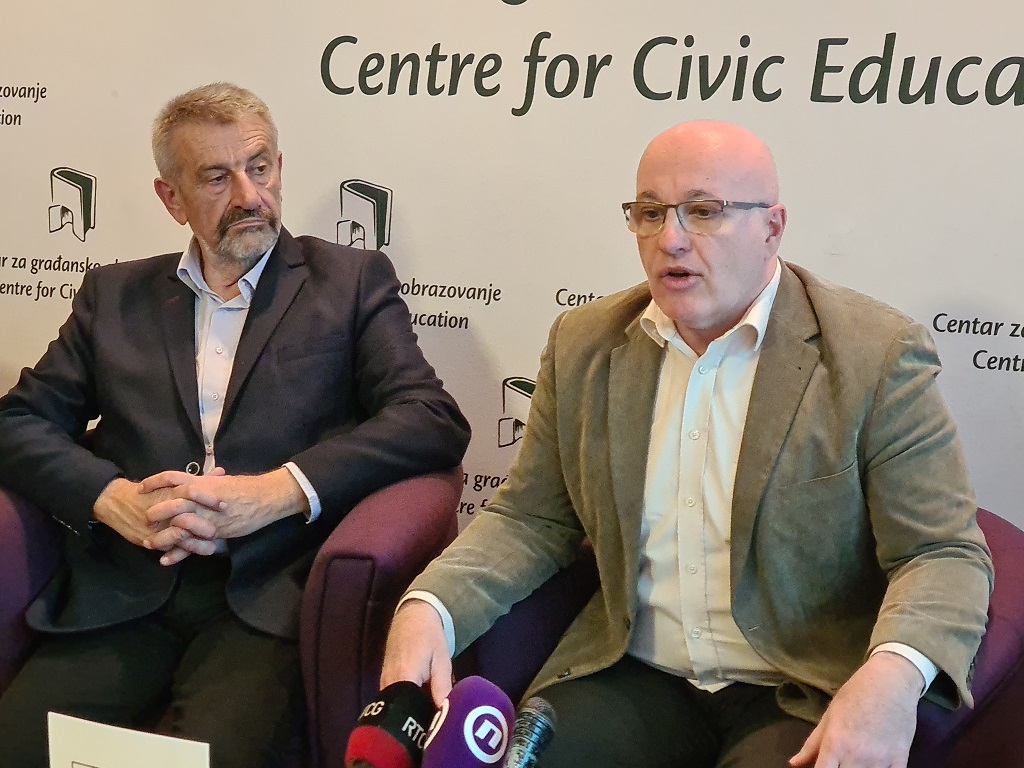
Rifat Rastoder, the author of the book “The Fate of Names“, points out that the complete truth about the war crime in Štrpci and at least the genuine remorse of those who in any way – by doing or not doing – participated in creating awareness and a climate in which such a thing could happen to everyone was the most appreciated. “Unfortunately, there is too little hope for such a scenario, because there are too many people who even today participate in the creation of public opinion in many respects similar to those of the nineties, such as the outgoing prime minister. Their irrational mission of national, or more precisely, inter-national reconciliation is hindered “too often” by the actualization of various anniversaries,” he said. He adds that real chances to solve many things in an adequate way are disappearing. “The prospects of finding the bones of the victims are narrow. There are too few parents still alive, and the descendants are already closer to the second half of their life and have overcome a lot on their own. The status of civilian victims of war was never recognized for them, nor their rights on that basis, so even our new sympathy, objectively, cannot mean much to them,” said Rastoder. Although it is significant in many aspects that the crime committed has finally been given some kind of judicial stamp, and despite the fact that there is no punishment that would be appropriate for the crime committed, Rastoder says that the sentences imposed, as well as all previous court processes, are closer to the continuation of the crime or at least humiliation in the sequels, but a real statement of justice.
Daliborka Uljarević, executive director of the CCE, reminded that the third decade is passing in a sign of institutions’ reluctance to adequately prosecute one of the most brutal crimes committed during the war in the 90s, with the absence of justice for the victims and their families. “For three decades, the Montenegrin authorities have ignored this crime. The authorities have also changed, but not the attitude towards this crime. We have neither the Law on the Missing Persons, nor the Law on Civilian Victims of War, nor the Law on Compensation for the Families of the Missing, which would regulate the status of the victims and their families in Montenegro and begin the process of ending the additional victimization they are experiencing,” she stated. As a positive step forward, she pointed out the erection of a memorial dedicated to the victims of this kidnapping in 2016 by the municipality of Bijelo Polje, but also as a negative that there is no memorialization at the state level. “Nevertheless, our efforts are not without resonance. I would like to remind you that our research from 2021 indicates that four out of five citizens in Montenegro have heard about the Štrpci case, while less than a fifth state that they do not know about this case. Among citizens who have not heard, the share of those with a high level of education is significantly lower (11%). That is why we at the CCE constantly point out the importance of education on these topics. Unfortunately, the crime in Štrpci does not exist in our formal education system, and when there is no factual record of that type, a base is created that is subject to manipulation. War crimes, regardless of who are the victims and who are the perpetrators, must never be forgotten. It is precisely today that the legacy of the unexplained past is returning to us as a burden on modern Montenegro. The families of the missing have the same right to the truth that the victims and their families have. Their unexplained fates stand as a reminder of our ineffectiveness and irresponsibility,” concluded Uljarević.
Velija Murić, lawyer and legal representative of the families, pointed out that these deaths, which are gathering us for a long time due to the need for memory, are not just any kind, they are not typical, and even less reasonable. “I will remind you that at the trial of the war criminal Nebojsa Ranisavljević, as a representative of the victims’ families, I asked a simple question: “Explain to us, you did not know these people, they did not do anything to you, why did you kill them?”. He answered without hesitation: “Well, they are Turks, they told us that Turks should be killed.” At such an answer, what else was left for me but to tell him: “Nebojša, you are also someone’s victim”, he stated. Murić emphasizes that the most painful point of the heinous killing of passengers abducted from the train from Štrpci station is the fact that they were killed only because of their name, religion and nation. “The people of Nebojša Ranisavljević, instead of kneeling and bowing to the mounds of innocent victims, continuously celebrate criminals. Because of such an unreasonable approach, it will not be surprising if in some future time, new some Ranisavljević, Lukić, Karadžić, Mladić, Milošević and other infamous “heroes” of this era will be born from the ranks of today’s extreme mural and graffiti artists,” he said. “The families of those victims, repeatedly impoverished over time, still do not have the status of crime victims, which cannot be understood otherwise than as the negligence of the state of which they belong. As always, the verbal promises with which politicians stop and stay are a special story that ultimately boils down to buying time or to a kind of logistics for those for whom the victims of crime are a national and political product, and the criminals are “of course” historical icons,” he believes. Murić also commented on the memorial to the victims, stating that it is not properly positioned and that it gives the impression that it was intended to be hidden.
Tea Gorjanc Prelević, Executive director of Human Rights Action (HRA), emphasized the responsibility of the authorities, who were obliged to protect all passengers and their citizens on that train, but they did not do so. “They betrayed their citizens of minority nationality. This is a danger that still hovers over us today, in our multicultural, multi-ethnic and multi-religious Montenegro. That is why we must work to confront this state crime, which was motivated by discrimination, and to bring to justice all those who allowed and carried it out,” she said. She also pointed out that after 30 years, those from the top of the government who allowed it have not been prosecuted, nor have all the perpetrators. “Between 25 and 28 perpetrators participated in the kidnapping, 15 of whom have been prosecuted so far. We insist that all those who made this crime possible be punished”, she stated, reading the names of persons who are in the court files and testimonies, and who have not yet been prosecuted. She also emphasized the importance of finding the remains of all victims. “The bodies of the 16 kidnapped passengers have not yet been found and the authorities in the region must make a concerted effort to find them. Perhaps the solution is to drain Lake Perućac, but the agony of the families needs to end”, believes Gorjanc Prelević. She reminded that the HRA has been appealing for years to provide the families of the victims with the status of civilian victims of the war and that they sent a proposal to amend the Law on Veterans and Disability Protection to the Government of Zdravko Krivokapić and Dritan Abazović, which remained without response. “Finally, I want us not to forget those people who distinguished themselves in the attempt to protect the victims. I am thinking, above all, of Tomo Buzov, who died because of that, and of Šefko Alomerović, the President of the Helsinki Committee for Human Rights in Sandžak,” she concluded.
In Štrpci, on 27 February 1993, 20 passengers were kidnapped from train “Lovćen” 671, which was travelling on the Belgrade-Bar line – Esad Kapetanović, Ilijaz Ličina, Fehim Bakija, Šećo Softić, Rifet Husović, Senad Đečević, Ismet Babačić, Halil Zubčević, Adem Alomerović, Muhedin Hanić, Safet Preljević, Džafer Topuzović, Rasim Ćorić, Fikret Memović, Favzija Zeković, Nijazim Kajević, Zvezdan Zuličić, Jusuf Rastoder, then Tomo Buzov, a retired military officer from Belgrade, and one unknown person.
Maja Marinović, Programme associate

